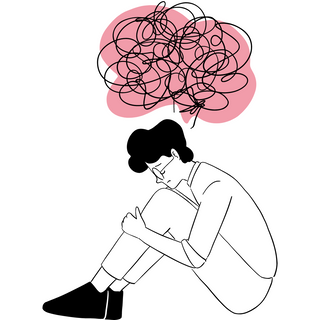Effects of anxiety on the body
Anxiety can be crippling, and not just for your mental health. Anxiety can wreak havoc on your physical wellbeing, too.
The brain
Anxiety increases the stress hormones in the brain, this is what leaves us feeling nervous or agitated. The stress hormones can trigger an increase in your heart rate as well as narrowing of the blood vessels, this leads to a rise in blood pressure.
If we’re constantly worrying, it’s easy to lose focus and it becomes more difficult to reason rationally. Some people describe their anxiety as a sense of doom, an impending doom that impacts our cognitive function. Anxiety can really interfere with your quality of life!
Severe anxiety can trigger panic attacks which are not kind on the body. Panic attacks can be painful, feeling like you’re not getting enough oxygen, heart palpitations and light-headedness. Headaches are common for people with constant anxiety, and it can also lead to heightened irritability.
The Heart
When we’re feeling anxious, our heart rate tends to speed up. Depending on the severity of your anxiety you could be experiencing heart palpitations which causes even more panic. This affects your overall general health & wellbeing. Anxiety can be tough to deal with and there are some natural remedies you can take to help relieve symptoms of mild anxiety, but for those who find it hard to mediate their stress levels, speak to a health professional.
Sleep schedule
How are you meant to sleep well when your mind is racing? As exhausting as anxiety can be on the body, it can lengthen the amount of time it takes to fall asleep and lessen the quality of your sleep. Unfortunately, this often leads to more stress and anxiety about getting through the next day!
Common symptoms of anxiety
Other symptoms of anxiety include:
- Shortness of breath
- Shaking or trembling
- Nausea
- Insomnia
- Dizziness
- Headaches
Anxiety vs. feeling anxious
Everybody experiences mild anxiety from time to time, but not everyone actually has anxiety. If your anxiety and nervous tension interferes with your quality of life; impairing your ability to function normally, then speak to your health professional. If you’re anxious about a deadline or going out alone, it’s probably just nerves! If your nervousness doesn’t interfere with your day-to-day activities, then you’re probably just experiencing “normal” anxiety.
What you can do
If you don’t suffer from an anxiety order but do experience a bit of nervous tension, then there are some techniques that can help control your stress levels.
- Lower your caffeine intake, if you’re having more than 2-3 cups of a day of coffee or any caffeinated beverage, your heart rate will increase! This often leads to heart palpitations and feelings of nervousness.
- Breathe in deeply through your nose, and slowly out your mouth. Slow deep breathing exercises have been proven to lower your heart rate!
Lifestyle changes
- Exercise regularly. Getting your heart rate up through exercise is great for the body. It can help to lower your resting heart rate (the average rate of beats per minute)
- Drink more water. Maintaining hydration plays an important part of keeping your heart healthy. Dehydration can cause headaches, fatigue and it makes it harder for your heart to keep the blood pumping, leading to it working overtime and increasing your heart rate.
- Get your 7-9 hours of shuteye. Getting a proper sleep allows our body to recover from all the hard work it’s done to get you through the day! If you don’t get enough sleep, it can negatively impact your cognitive function. It’s harder to concentrate when you’re tired and that can become overwhelming, ultimately leading to more stress and anxiety.
If you find yourself overthinking and worrying too much before bed, check out our Sweet Dreams gummies here. With the dream inducing ingredient valerian root extract to promote relaxation of the mind, shortening the time it takes for you to fall asleep. Taking 2 gummies before bed will help calm the nerves, letting your body unwind.

